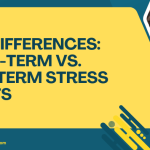Table of Contents
- Introduction
- 1. Impaired Cognitive Function
- 2. Increased Risk of Mental Health Disorders
- 3. Changes in Brain Structure
- 4. Reduced Neuroplasticity
- 5. Hormonal Imbalances
- Conclusion
- FAQs
Introduction
Chronic stress is more than just an occasional feeling of overwhelm; it can have profound effects on our brain health. As our lives become busier and more demanding, understanding the implications of chronic stress on our neurological well-being is crucial. In this article, we will explore the top five ways that chronic stress can impact your brain health, providing insights into how you can mitigate these effects for a healthier mind.
1. Impaired Cognitive Function
Chronic stress can significantly impair cognitive functions such as memory, attention, and decision-making. When you experience stress, your body releases a surge of cortisol, the primary stress hormone. Elevated cortisol levels over time can disrupt the hippocampus, the area of the brain responsible for forming new memories and learning.
How It Affects You:
– Memory Problems: Studies have shown that individuals experiencing chronic stress often report forgetfulness and difficulty concentrating.
– Decision-Making Issues: Stress can lead to hasty decisions, as the brain becomes more reactive and less analytical during high-pressure situations.
What You Can Do:
– Engage in mindfulness practices like meditation to help lower cortisol levels and improve cognitive function. For more effective strategies, explore top 5 ways to integrate neuro care into your wellness routine.
– Regular exercise can also boost brain health by increasing blood flow and promoting the release of neurotransmitters that enhance mood and cognition.
For further reading, check out the American Psychological Association for insights on stress and cognitive function.
2. Increased Risk of Mental Health Disorders
Chronic stress is a well-known risk factor for various mental health disorders, including anxiety, depression, and post-traumatic stress disorder (PTSD). The continuous activation of the stress response system can lead to emotional dysregulation, making individuals more susceptible to mental health challenges.
How It Affects You:
– Anxiety Disorders: Chronic stress can heighten feelings of anxiety, making daily life increasingly difficult.
– Depression: Prolonged exposure to stress hormones can lead to changes in brain chemistry that may trigger depressive symptoms.
What You Can Do:
– Seek support from a mental health professional if you notice signs of anxiety or depression.
– Consider engaging in regular physical activity, as it has been shown to boost mood and alleviate symptoms of these disorders. Learn more about the importance of caregiver support in enhancing neuro care effectiveness.
For more information, visit the National Institute of Mental Health on the relationship between stress and mental health.
3. Changes in Brain Structure
Research has indicated that chronic stress can lead to structural changes in the brain. Prolonged exposure to elevated cortisol levels can cause the brain to shrink, particularly in areas such as the prefrontal cortex and hippocampus, affecting both cognition and emotional regulation.
How It Affects You:
– Reduced Gray Matter: Chronic stress can lead to a decrease in gray matter volume, which is crucial for processing information and emotional regulation.
– Increased Amygdala Size: The amygdala, which plays a key role in processing emotions, can become hyperactive and enlarged due to chronic stress.
What You Can Do:
– Engage in activities that promote brain health, such as puzzles, reading, or learning a new skill to stimulate neural pathways. This is closely related to the insights provided in the top 5 essential insights on neuro care you need to know.
– Ensure you get adequate sleep, as restorative sleep is vital for maintaining brain structure and function.
For more details, you can explore studies published by the Frontiers in Neuroscience.
4. Reduced Neuroplasticity
Neuroplasticity refers to the brain’s ability to adapt and reorganize itself by forming new neural connections. Chronic stress can impair neuroplasticity, making it harder for the brain to learn and adapt to new experiences.
How It Affects You:
– Learning Difficulties: Stress can make it challenging to acquire new information or skills, affecting personal and professional growth.
– Difficulty in Recovery from Trauma: Individuals may find it harder to process and recover from traumatic experiences when neuroplasticity is compromised.
What You Can Do:
– Practice lifelong learning by taking up new hobbies or enrolling in courses to stimulate your brain. Check out top 5 exercises to boost your neurological health for more ideas.
– Incorporate stress-reducing techniques such as yoga or tai chi, which can enhance neuroplasticity.
For more insights, the Harvard Medical School offers resources on neuroplasticity and stress.
5. Hormonal Imbalances
Chronic stress can lead to hormonal imbalances that affect various systems in the body, including the endocrine system, which regulates hormones. This imbalance can have cascading effects on mood, energy levels, and overall brain function.
How It Affects You:
- Adrenal Fatigue: Prolonged stress can lead to adrenal fatigue, characterized by low energy and mood swings.
- Thyroid Dysfunction: Chronic stress can also impact thyroid function, leading to symptoms such as fatigue, weight gain, and depression.
What You Can Do:
- Maintain a balanced diet rich in nutrients to support hormonal health. Foods like leafy greens, fatty fish, and nuts are beneficial. For strategies on how diet influences neuro care, explore top 5 diet changes to manage neurological disorders.
- Ensure regular check-ups with your healthcare provider to monitor hormone levels and address any imbalances.
For authoritative information, visit the Endocrine Society for guidance on managing hormonal health.
Conclusion
Chronic stress can have profound and lasting effects on brain health, from impaired cognitive function to hormonal imbalances. Recognizing these impacts and implementing strategies to reduce stress is crucial for maintaining a healthy mind. Prioritize self-care, seek professional help if needed, and adopt lifestyle changes that promote brain health.
FAQs
Q: How can I tell if I am experiencing chronic stress?
A: Symptoms of chronic stress can include fatigue, irritability, difficulty sleeping, frequent headaches, and physical symptoms such as muscle tension. If you notice these signs persisting over time, consider consulting a healthcare professional.
Q: What are some effective stress management techniques?
A: Techniques such as mindfulness meditation, deep breathing exercises, regular physical activity, and maintaining a healthy social support network can significantly reduce stress.
Q: Is it possible to reverse the effects of chronic stress on my brain?
A: While some changes may be permanent, engaging in stress-reducing activities, seeking therapy, and adopting a healthy lifestyle can improve brain function and mitigate some effects of chronic stress.
By understanding the impact of chronic stress on brain health and taking proactive steps, we can foster a stronger, healthier mind. For additional insights, consider exploring the differences between neuro care and mental health care as discussed in neuro care vs. mental health care: key differences explained.






